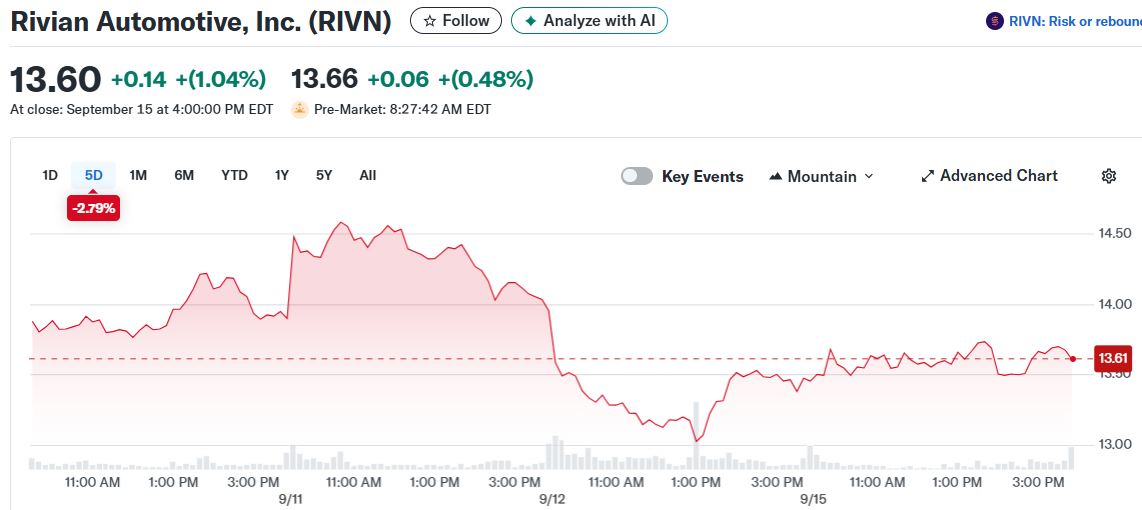TLDR
- Rivian begins construction on $5 billion Georgia manufacturing facility despite $1.66 billion first-half 2025 losses
- Georgia plant will produce 200,000 vehicles yearly starting 2028, doubling company’s production capacity
- EV market growth slows to 1.5% in 2025 as Trump administration ends $7,500 tax credits
- Rivian holds 3% US EV market share while Tesla dominates with 45% market control
- Company faces “do or die” moment as competition intensifies from Ford and General Motors
Rivian Automotive broke ground Tuesday on its delayed $5 billion Georgia manufacturing plant. The electric vehicle startup moves forward despite losing $1.66 billion in 2025’s first half.

The California-based company faces mounting pressure as EV sales growth slows nationwide. Electric vehicle sales rose just 1.5% in the first half of 2025, according to Cox Automotive data.
Rivian currently operates one plant in Normal, Illinois. The facility produces R1T pickup trucks starting at $71,000 and R1S SUVs. The company also manufactures delivery vans for Amazon.
The Illinois plant will begin R2 SUV production next year with $45,000 starting prices. Current facility capacity reaches 215,000 vehicles annually after expansion.
Georgia Plant Critical for Profitability
The Georgia facility represents Rivian’s path to large-scale production and profitability. The plant will manufacture 200,000 vehicles yearly beginning in 2028. A second phase could add another 200,000 vehicles in annual capacity.
These numbers dwarf current production levels. Rivian expects to deliver 40,000 to 46,000 vehicles this year, down from 52,000 in 2024. The company limits current production to prepare 2026 model launches.
“For Rivian, it’s do or die time,” said Alex Oyler from SBD Automotive. “The key to profitability is scale, and you can’t scale if your cheapest vehicle is $70,000.”
Tesla controls 45% of US electric vehicle sales in 2025’s first half. General Motors captured 13% market share. Rivian holds 3% but leads among startup automakers excluding Tesla.
Ford’s F-150 Lightning and Chevrolet’s electric Silverado now compete directly with Rivian trucks. The company initially dominated the electric pickup niche.
Market Challenges Mount
Rivian stock has dropped over 80% since its 2021 public offering. The decline contrasts with traditional automaker stocks outperforming broader markets.
President Trump ended EV tax credits September 30. Buyers no longer receive up to $7,500 in savings per vehicle purchase. Rivian says it never relied on federal incentives for its business model.
Several automakers are retreating from electric vehicle plans. Stellantis canceled Ram’s electric truck program. Ford delayed Tennessee plant production. General Motors abandoned Detroit-area EV manufacturing plans.
Rivian faces additional headwinds including $2,000 per vehicle tariff costs. The ended tax credit program will cost $140 million in 2025 revenue.
Georgia promised $1.5 billion in incentives for 7,500 jobs paying average $56,000 salaries. The state already spent $175 million on land acquisition and infrastructure improvements.
Federal Support Continues
Volkswagen invested $5.8 billion in Rivian for software technology access. The Biden administration approved a $6.6 billion loan for Georgia construction in November.
Construction began after cash-burning forced 2024 delays. Some local residents oppose the plant over groundwater pollution concerns.
Rivian expects federal loan distribution despite the Trump administration’s EV opposition. The company argues the plant supports domestic manufacturing goals.





